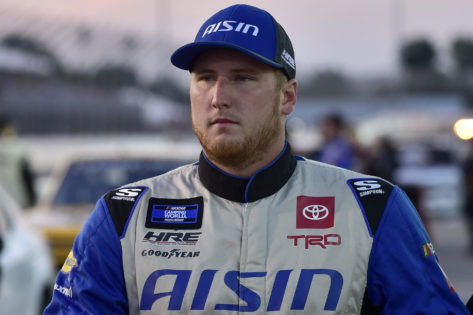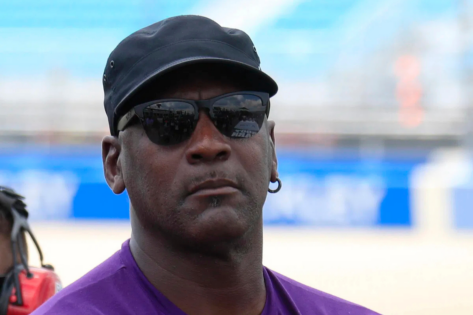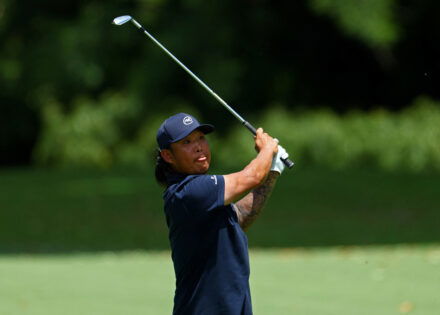“When you intentionally wreck somebody, we don’t realize that could k–l that person.” Mark Martin commented on the suspension of Austin Hill. The Indianapolis Motor Speedway has witnessed countless moments of drama, but few as polarizing as the recent collision between Richard Childress Racing’s Austin Hill and veteran driver Aric Almirola during the Xfinity Series race. On a scorching afternoon with championship implications looming, the pivotal incident unfolded not in isolation but amid the tension of a typical battle. For fans in the stands, the moment seemed abrupt: two contenders in the top five, doors slamming, one car rocketing into the wall.
The murmur quickly spread from pit lane to social media, where speculation swirled about intent and consequence. For Austin Hill, the reverberations were both immediate and deeply personal: race-ending penalties, an official suspension, and intense scrutiny on his motives. Through the noise and opinions, one thing stood out—Hill’s silence, and the sense that an explanation was imminent. But as paddock rumors simmered and NASCAR delivered swift discipline, only Hill himself knew the truth of what happened on that fateful turn.
Austin Hill defends intent after Almirola crash fallout
With emotions still raw, in the wake of the Indianapolis wreck, Austin Hill recently spoke candidly about his controversial encounter with Aric Almirola. Addressing the question everyone in the NASCAR community has debated, Hill delivered his main message in five poignant words: “It wasn’t done on purpose.” In a conversation with reporter Dustin Albino, Hill elaborated: “I know that when I go to my grave way down the road that it wasn’t done on purpose.”
That powerful statement comes after Hill endured public skepticism and official condemnation, a one-race suspension from NASCAR, and the stripping of all 21 playoff points he’d earned so far in the season. For Hill, the consequences were immediate and severe: his playoff hopes thrown into jeopardy, and Richard Childress Racing forced to name a replacement driver for the Iowa race.
Hill’s defense centers around denying malicious intent. After Almirola nudged him exiting Turn 3, Hill’s car slid up the track before he appeared to steer sharply left, hooking Almirola’s right rear and sending him into a brutal crash against the outside wall. The penalty of five laps held for reckless driving, followed by suspension, seemed only to intensify the spotlight.
Spoke with Austin Hill today to discuss his reaction to the Indianapolis incident with Aric Almirola. He vows “it was fully unintentional.”
“I know that when I go to my grave way down the road that it wasn’t done on purpose.”https://t.co/aAVrPzwKME
— Dustin Albino (@DustinAlbino) August 8, 2025
The radio transcripts from Hill during the aftermath capture a driver adamant that he is saying, “Oh, they can go f** themselves. F* NASCAR. That is f** bulls* … I’m f*** sideways, I go to correct it back to the left. It’s locked to the left, and I run into the #19 [Almirola].” But NASCAR’s officials, along with many observers, were not convinced. Almirola, for his part, called it “definitely intentional,” describing the hit as one of the biggest of his career.
Hill’s insistence that the crash was a result of misjudgment rather than intent stands in contrast to both the optics of the incident and the rulings of those in charge. For fans and competitors, the statement offers a glimpse into a driver’s struggle to reconcile split-second decisions with their far-reaching impacts and lays bare the fine line between aggression and error in motorsport.
Aftershock: consequences, playoff path, and the implications
Hill’s denial of intent made headlines, but the incident continues to impact his 2025 season. His suspension cost him all playoff points, and although he received a waiver from NASCAR, the decision raised questions about disciplinary consistency. With just three regular-season races left, every race is now a must-win for Hill to keep his postseason hopes alive.
Kaulig Racing’s Chris Rice voiced strong opposition to a waiver during his appearance on SiriusXM NASCAR Radio. In his eyes, the punishment should stick, and Hill should earn his playoff berth the hard way. “I think in this situation, the driver should lose all his points and the team should keep their points because you, in Xfinity, you’re racing for owner points and driver points,” he further added. “It’s a little different than Cup… I think a driver should have to come back and win again. Because at some point, we got to explain to these race car drivers that these guys spend a lot of money for them to race cars.”
Previously, when Hill was suspended during the weekend at Iowa Speedway, the team said in a social media post, “Richard Childress Racing will not appeal the penalty NASCAR issued to the No. 21 team following the NASCAR Xfinity Series race at Indianapolis Motor Speedway. We remain focused on winning a championship with Austin Hill in 2025.” In Hill’s absence, Cup Series regular Austin Dillon subbed for the #21 car at Iowa, underlining both the logistical headaches and the adaptability demanded by high-level competition.
Beyond Hill’s fate, Indianapolis serves as a case study in NASCAR’s approach to discipline and the gray area between intentional retaliation and racing “hard.” NASCAR’s policy reflects growing concern for safety, as Almirola’s harrowing crash reminded everyone of motorsport’s unforgiving margins. The playoff points penalty, introduced for 2025, adds further teeth to deterrence while complicating the playoff landscape for drivers facing disciplinary action.
For the fans, pundits, and teams, the Indianapolis controversy isn’t just about intent; it’s about how NASCAR balances fairness, safety, and spectacle. As Austin Hill returns to the cockpit with his reputation and season on the line, his five-word declaration hangs in the air as a reminder of the sport’s high stakes and the sometimes-blurred boundary between mistake and malice.
The post Richard Childress’ NASCAR Driver Breaks Silence on Indianapolis Controversy in 5-Words appeared first on EssentiallySports.



